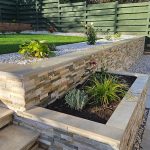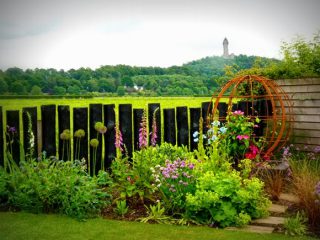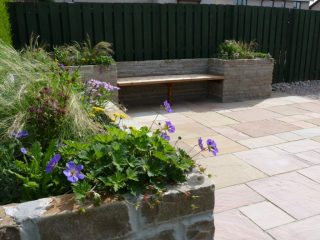It’s Only A Phase!
Monday, 07 September 2015
Clients commonly ask us if it is OK if they can phase their garden build. We ensure there is complete flexibility with all our designs and how they are built. If it’s something you are considering read our blog about the benefits and downsides to this approach.
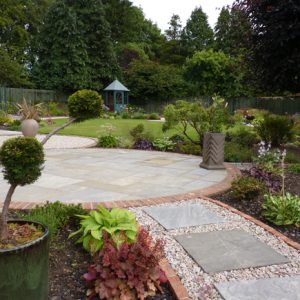
A garden in Perth which was built over two phases
Sometimes it’s not possible to build your newly designed dream garden at the one time. Maybe budget doesn’t allow it or perhaps other building work going on in the house might impact on the garden. By building the design in phases, though, it is still possible to eventually get the dream garden over a longer timescale.
Planning Process
The most important thing is to be organised and draw up a masterplan of everything the final garden will contain. This masterplan will ensure that the phases marry together neatly and produce a cohesive overall feel once all stages are complete. The master design also becomes roadmap for every cable and pipe to be laid above or below ground and the identity and position of every tree and plant. For example if you’re laying a patio in an early phase it will be important to know if you’re installing a lighting feature at a later stage so that electrics can be properly located and the patio doesn’t need to be lifted temporarily.
It is useful to also have a mood board of the different soft and hard landscaping to be used in each phase to give a greater appreciation of how those will work together too.
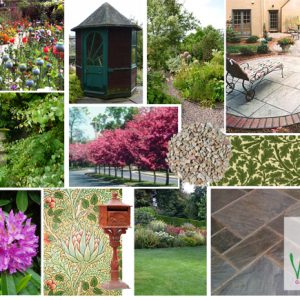
A mood board shows all the areas of the garden which will come together
Building Process
In order to get as much instant gratification as possible the larger surfacing work should be done in phase one. This includes laying patios and lawns further away from access points. Not only will you be able to enjoy these spaces but getting the soil covered will help keep your house clean! Another priority should be getting shelter from wind or sun and some privacy/security. This could be boundaries such as fences and walls or trees. If you’re including any “grow your own” areas you might wish this to be done earlier in the build too so you can start to re-coup money savings on shop bought produce.
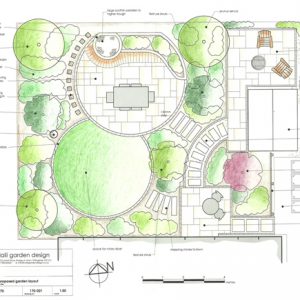
A design for a phased garden in Stirling
If you’re redesigning front and back gardens it can be tempting to start with the front garden to get best kerbside effect. But all the hard work can easily be damaged if there are subsequent access issues getting materials into the rear garden and waste out. It’s best not to “paint yourself into a corner”!
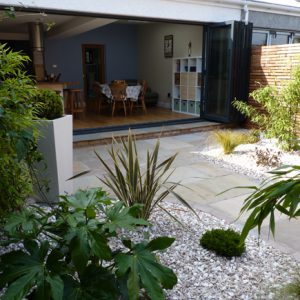
Phase 2: This back garden was phased to tie in with the new house extension
Benefits
Downsides
- You will miss out on the immediate wow factor of having your whole garden transformed at the same.
- The overall cost is likely to be a bit greater. A project broken into phases normally costs more than a whole project built at once. This is because elements of the overall garden build normally overlap so you can save on manual labour costs as the team can be getting on with another aspects they wait for patios to set or paint to dry etc.
- Some areas of the garden may need to be re-done if there is a lot of traffic going over them during Phase 2 (however, we would normally recommend a certain way of work being done to minimise this and we always protect existing work which is to be kept.)
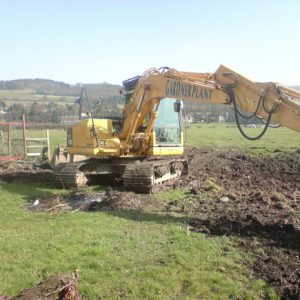
It’s important to think how the phasing will work so no damage is done to areas already completed
Before Your Design
If you’ve not long moved into the property, spend time to work out just how your existing garden works for you.
- What existing plants do you like/not like?
- What other features would you like to keep or introduce?
- Who will we using the garden?
- What do you use your garden for and at what time of day?
- How much growing space do you want for fruit and veg?
- How much time do you have to maintain the design?
So if you are considering a new look to your garden please get in touch and we will be round to help you plan a master design so you can get everything on your “essential”,”nice to have” and “dream” lists.
All at Vialii

